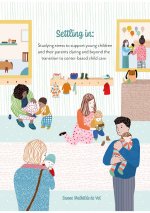
Settling in: studying stress to support young children and their parents during and beyond the transition to center-based child care
Omschrijving
Voor haar Engelstalige proefschrift ‘Settling in’ onderzocht Sanne de Vet het ervaren van stress door jonge kinderen die naar de kinderopvang gebracht worden. De resultaten laten zien dat een aanzienlijk deel van deze kinderen én ook hun ouders dan stress ervaren. Na het brengen ervaren de kinderen ook nog geruime tijd stress, onafhankelijk van de kwaliteit van de opvang.
Onderzoek naar stress bij jonge kinderen
Studies naar specifiek baby’s, de periode rondom de start in de kinderopvang en de beleving van ouders zijn schaars. Daarom heeft Sanne de Vet met haar collega’s onderzoek gedaan naar stress bij jonge kinderen – met speciale aandacht voor baby’s en hun ouders tijdens de start op het kinderdagverblijf.
Het proefschrift draagt bij aan bestaande kennis over stress bij jonge kinderen in de kinderopvang doordat een meta-analyse, een grootschalige correlationele studie en een kleinere longitudinale interventiestudie met diverse methoden zijn uitgevoerd.
Aankopingspunten
“We hebben enkele aanknopingspunten gevonden voor manieren van ondersteuning die de start in de kinderopvang mogelijk kunnen vergemakkelijken voor jonge kinderen en hun ouders”, zegt Sanne de Vet. “Aangezien er is gevonden dat een aanzienlijk deel van de ouders en kinderen stress ervaart rondom en na de start in de kinderopvang, is het belangrijk dat pedagogisch medewerkers hier aandacht voor hebben en het gesprek hierover aangaan met ouders. Ze kunnen dit doen door kinderen bijvoorbeeld wat vaker kortere momenten te komen laten wennen en extra op kinderen te letten tijdens mogelijk stressvolle momenten gedurende de dag op het kinderdagverblijf. Voornamelijk jongere kinderen zullen gebaat zijn bij extra aandacht tijdens de (her)start op het kinderdagverblijf of bij de start in een nieuwe groep.”
Engelstalige introductie
Center-based child care settings, once founded to allow working-class mothers to work outside of the home, have become an established form of non-parental child care for many families all over the world, in which numerous children spend a large part of their early life (Clarke-Stewart & Allhusen, 2005). According to the Organization for Economic Cooperation and Development (OECD, 2021), center-based child care is even the most commonly used form of non-parental child care during early childhood in economically advanced societies, next to home-based child care, care at home provided by professional childminders, and informal care. The first large-scale and longitudinal study into the long-term effects of non-parental child care on the development of children was conducted in the United States by the National Institute for Child Health and Human Development Early Child Care Research Network (NICHD Early Child Care Research Network, 2006).
The NICHD Early Child Care Research Network researchers found that out-of-home child care had both positive and negative effects on young children, and that these effects were moderated by several factors such as quality and quantity of care (NICHD Early Child Care Research Network, 2006). The positive effects of child care mainly lied in the domains of cognitive development and language skills, while the more negative effects of child care were related to behavioral problems (NICHD Early Child Care Research Network, 2006). Later studies also included the measurement of tress to capture the short-term effects of child care and daily experiences of children in child care, showing that the stress system is dysregulated when children are at child care, especially around transitions (Engel & Gunnar, 2020). Although the effects of attending child care on the stress system were rather showed to be rather small, they were found repeatedly and are applicable to a large group of children worldwide (Fukkink et al., 2017).
Moreover, a dysregulation of the stress system has potential negative long-term consequences. However, it is not completely clear yet what factors play a role in this stress response, in particular for infants and around transitions to child care. Moreover, the role of parents, as well as the stress they might experience themselves around this transition, has been largely overlooked. These topics deserve further attention. Therefore, the aim of the current dissertation was to elucidate the correlates of physiological and behavioral stress (especially around transitions) for young children (aged 0 – 4 years, with a specific focus on infants) and their parents in the context of center-based child care, and to examine whether and how we can support families with the aim of reducing stress.
